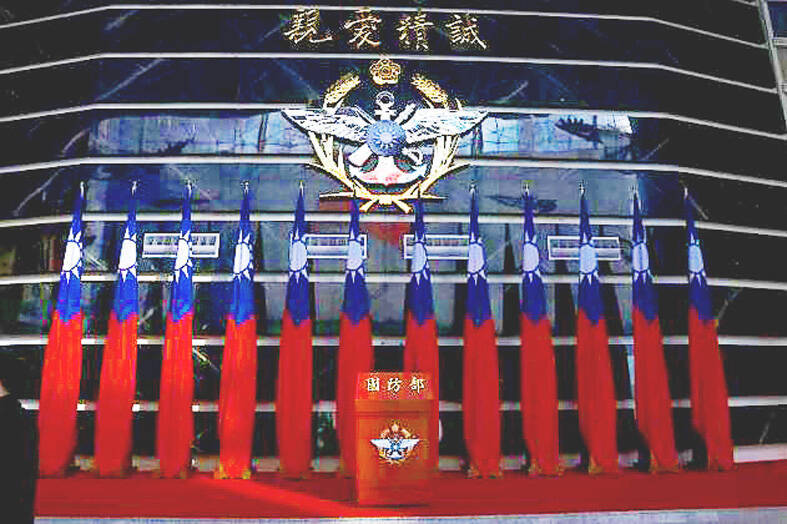《TAIPEI TIMES》Ministry planning tougher spy rules - 焦點 - 自由時報電子報

限制級
您即將進入之新聞內容 需滿18歲 方可瀏覽。
根據「電腦網路內容分級處理辦法」修正條文第六條第三款規定,已於網站首頁或各該限制級網頁,依台灣網站分級推廣基金會規定作標示。 台灣網站分級推廣基金會(TICRF)網站:http://www.ticrf.org.tw
National flags are pictured at the Ministry of National Defense in Taipei in an undated photograph. Photo: Ann Wang, Reuters
2025/03/11 03:00
By Huang Ching-hsuan / Staff reporter
The Ministry of National Defense yesterday said it plans to propose a bill to punish active military personnel who pledge loyalty to an enemy and damage military interests.
The amendment to Article 24 of the Criminal Code of the Armed Forces (陸海空軍刑法) is aimed at halting the infiltration efforts of the Chinese Communist Party (CCP).
A report released earlier this year by the National Security Bureau said that the number of Chinese spies prosecuted in Taiwan rose to 64 people last year, and 28 of them were active military personnel.
PRISON TERM
Under the proposed bill, active military personnel who pledge loyalty to an enemy — through speech, actions, words, pictures, digital records or other methods — sufficiently to harm military interests would face a prison sentence of one to seven years, the ministry said.
In the past few years, the military has collaborated with national security agencies to crack down on Chinese spying, which showed that the CCP’s espionage and spying activities are becoming more rampant, the ministry said.
INDUCED BY MONEY
In most of the spying cases, active military personnel were induced by money, investments or gambling, and were asked to sign documents or film videos to pledge their loyalty to the enemy, which seriously harms national security, it said.
It said it would submit the bill to the Executive Yuan for review after legal procedures are completed.
Under the Constitution and other laws, active military personnel must be loyal to the nation, protect its citizens and diligently perform their duty to safeguard national security, the ministry said.
A few members of the military have committed treason and unlawful acts, and under the new bill, they would not only be despised by the public, they would also not escape the law, it said.
新聞來源:TAIPEI TIMES
網友回應

